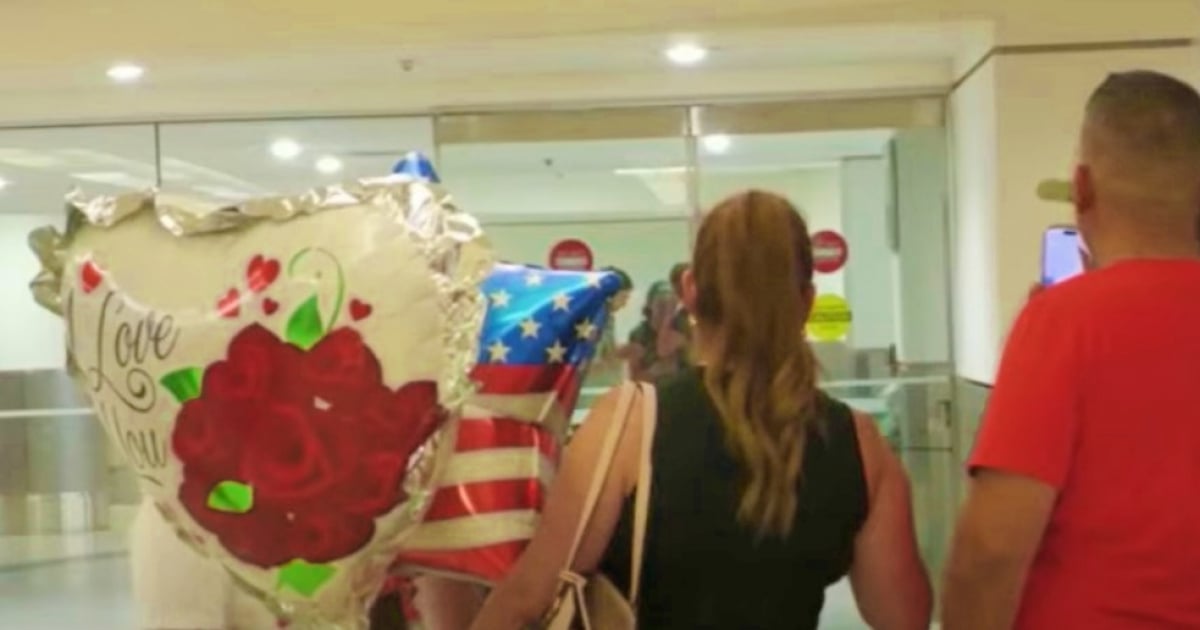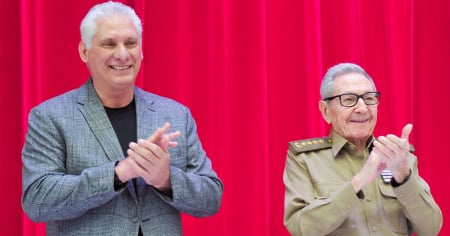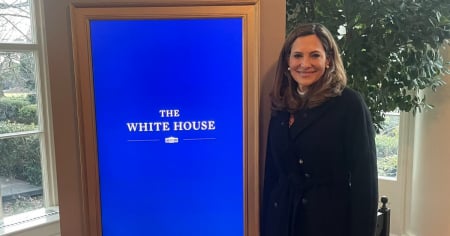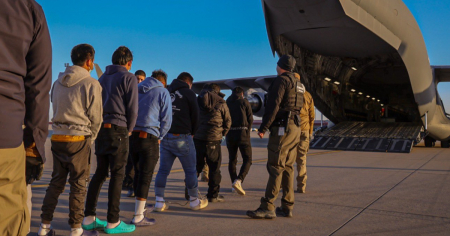
Related videos:
Tuesday, February 4, 2025, news in the United States is impacting the lives of thousands. President Trump is preparing to revoke the humanitarian parole, affecting migrants from Cuba and other countries. A Cuban man arrested in Florida will be deported by ICE, while the agency is releasing some detainees due to lack of space. Below, we outline the main news of the day.
Trump plans to revoke legal status for Cubans and other migrants under humanitarian parole
The administration of Donald Trump is preparing to revoke the legal status of more than 530,000 migrants from Cuba, Haiti, Nicaragua, and Venezuela who were welcomed under the humanitarian parole program. This initiative by the Biden administration allowed the legal entry of migrants with sponsors in the U.S. who would support them financially. Now, those without any other immigration benefits would face deportation proceedings and lose their right to work legally. This change in immigration policy has generated criticism and concern among the beneficiaries. Some have additional protections such as TPS or the Cuban Adjustment Act, but uncertainty remains.
Cuban with a criminal record arrested by ICE in Florida will be deported
A Cuban with multiple criminal convictions was arrested by the U.S. Immigration and Customs Enforcement (ICE) during an operation in southern Florida, being one of the 32 foreigners captured due to their irregular immigration status and committed crimes, such as fraud and violating probation. The deportation of this individual and others arrested from various countries is expected as part of the immigration policies of the Trump administration, focused on controlling illegal immigration and strengthening border security. ICE has intensified operations, resulting in over 8,000 arrests since the beginning of the current administration.
Limitations and strategies of ICE in response to the release of immigrants in the U.S.
The U.S. Immigration and Customs Enforcement (ICE) has been forced to release certain detained immigrants due to a lack of space in detention centers and legal restrictions. Despite the Trump administration's policy of eliminating "catch and release," ICE faces limitations in retaining all detainees with a budget for 41,500 beds. Through programs like Alternatives to Detention (ATD), the released individuals are monitored using technologies such as ankle monitors. Factors such as health issues and family responsibilities influence the release decision, leading to criticism from various sectors.
José Daniel Ferrer defends his stance after being called a "traitor" for proposing reconciliation with the Cuban regime
The leader of the Patriotic Union of Cuba (UNPACU), José Daniel Ferrer, is facing controversy after suggesting a possible reconciliation with the Cuban regime if a transition process is initiated. In an interview, Ferrer stated that his history of fighting for democracy and human rights is evidence of his commitment and called for following the examples of peaceful transitions like those in Poland and Chile. His statements have sparked intense debate both inside and outside of Cuba, highlighting the rejection from opposition member Manuel Milanés, who harshly criticized Ferrer's proposals. Despite the criticism, Ferrer reaffirms his commitment to the peaceful struggle for a free Cuba.
China responds to Trump's trade war with new tariffs
The trade conflict between China and United States is escalating with the imposition of new tariffs by Beijing. The Chinese government has established additional tariffs of 10% on crude oil and agricultural machinery, and 15% on liquefied natural gas. Furthermore, they have implemented export controls on critical minerals such as tungsten. The response to Donald Trump's measures could be a strategy to exert pressure ahead of future negotiations, while the conflict is taken to the WTO and investigations against Google for monopoly continue.
Miami welcomes the first nude cruise in the Caribbean
The first great nude cruise has set sail from Miami for an 11-day journey through the Caribbean islands on the Norwegian Pearl, a ship from Norwegian Cruise Line. Organized by the agency Bare Necessities, this nude trip includes stops in the Bahamas, Puerto Rico, and other paradise islands, concluding on February 14th. The price for this unique experience ranges from $2,000 to $33,155, depending on the type of cabin. Despite the emphasis on nudity, there are strict rules such as dressing in specific areas and restrictions during port stops. The initiative aims to provide relaxing and natural vacations, celebrating the human form without adornment.
Cuban illegal immigrant with gang ties and a deportation order arrested in Florida
Authorities from immigration and security in Florida arrested an undocumented Cuban immigrant with alleged ties to gangs and a pending conviction. The operation, carried out by ICE in Miami along with the Orlando Suboffice and the Tampa Department of Homeland Security, apprehended the Cuban, who had previously been arrested for grand theft. This trend is increasing with the new deportation policies of President Donald Trump, aimed at curbing illegal migration and securing U.S. borders.
Mexico deploys 10,000 soldiers to the border as Trump postpones tariffs
In response to migration pressures and threats from the United States, Mexico has deployed 10,000 soldiers to its border. This follows a conversation between Claudia Sheinbaum and Donald Trump, who announced a one-month suspension of tariffs. Trump emphasized on Truth Social that Mexico will take action to stop the flow of fentanyl and illegal migrants, and both countries will begin negotiations on security and trade. Sheinbaum confirmed the agreements, which include the United States' commitment to reduce the flow of weapons to Mexico.
Elon Musk attacks NED and USAID in his crusade for cuts in public spending
Businessman Elon Musk, as director of the Department of Government Efficiency, has launched a frontal attack against the National Endowment for Democracy (NED) and the United States Agency for International Development (USAID), labeling it a "criminal organization." Musk aims to cut "unnecessary" public spending and has sought assistance from users of the social media platform X, formerly Twitter. These actions coincide with new policies from the Trump administration affecting Cuban media and NGOs, leading to uncertainty regarding their funding.
Díaz-Canel criticizes deportations in the United States during the ALBA-TCP summit
The Cuban leader Miguel Díaz-Canel lashed out at the immigration policies of the United States, calling them “violent and indiscriminate” during the XII Summit of the ALBA-TCP in Venezuela. He accused Washington of using deportations as a “political pressure mechanism” against Latin America, while Cuba faces a mass exodus due to the economic crisis. Díaz-Canel also criticized the establishment of a detention center in Guantánamo and asserted that deportations must respect national sovereignty, despite the restrictions that his own government imposes on those wishing to emigrate legally.
Frequently Asked Questions about Trump's Immigration Policies and Humanitarian Parole
What is humanitarian parole and why is it relevant for Cuban migrants?
The humanitarian parole is a program created by the Joe Biden administration to allow the temporary entry of migrants from Cuba, Venezuela, Nicaragua, and Haiti. This program provided a legal and safe pathway for these individuals to enter the United States, as long as they had sponsors to support them financially. It has been crucial for many Cubans seeking to escape the economic and political crisis on the island.
How do Trump's new policies affect beneficiaries of humanitarian parole?
The new policies of Donald Trump aim to revoke the legal status of migrants who entered under humanitarian parole. Beneficiaries could face deportation proceedings if they have not secured another immigration benefit, such as asylum or permanent residency. This creates a climate of uncertainty for over 530,000 individuals who relied on the program.
What alternatives do Cuban migrants have following the elimination of humanitarian parole?
Cuban migrants in the United States may consider options such as the Cuban Adjustment Act, which allows them to apply for permanent residency after one year and one day in the country. They can also explore applying for political asylum or an employment visa, depending on their personal circumstances. However, they must act quickly to avoid falling out of the legal framework.
What measures has ICE taken to deport undocumented immigrants in Florida?
ICE has intensified operations in Florida, arresting immigrants with irregular status and a criminal record. These actions are part of the Trump administration's policies to control illegal immigration and strengthen border security. Those detained, such as the Cuban arrested recently, are being processed for deportation.
Filed under:





